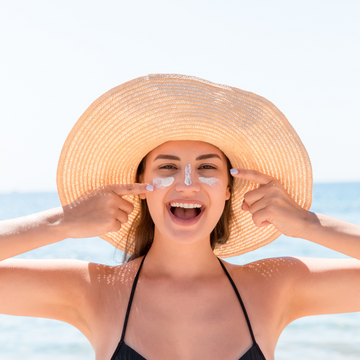Summer is here, and with it, the long hours in the sun. Protecting your skin from sun damage is essential not only to avoid sunburn, but also to prevent premature ageing and the risk of skin cancer. In this article, we will look at the different types of sunscreens, how to choose the right sun protection factor and the differences between chemical and physical sunscreens.
Types of Suncreens
Sunscreens can be classified into two main categories: chemical and physical.
Chemical sunscreens:
- How do they work? These sunscreens absorb the sun's UV rays before they can damage the skin.
- Pros: They are generally lighter in texture and easier to apply without leaving a white residue.
- Cons: Some ingredients may cause irritation to sensitive skin and there are concerns about their environmental impact, especially on coral reefs.
Physical (or mineral) sunscreens:
- How do they work? They create a physical barrier on the skin that reflects and scatters UV rays.
- Pros: They are less likely to irritate the skin and offer immediate protection upon application.
- Cons: They can leave a white film on the skin and are thicker, which can be a drawback for some people.
Choosing the Right Sun Protection Factor (SPF)
The sun protection factor, or SPF, indicates the level of UVB protection a product offers. Here's how to choose the right one:- SPF 15-30: Suitable for daily use if you spend short periods outdoors.
- SPF 30-50: Recommended for moderate sun exposure, such as when you are outdoors for several hours.
- SPF 50 or higher: Ideal for people with very fair skin, those who burn easily or when exposure to the sun is intense and prolonged.
It is important to apply sunscreen correctly and reapply every two hours or after swimming or sweating to maintain its effectiveness. Remember, the best defence against sun damage is proper and regular application of an effective sunscreen.
Importance of Post-Solar Care
Post-sun care is vital for skin recovery. Aloe Vera Exclusive products not only help to soothe and repair the skin after sun exposure, but also offer anti-inflammatory and antioxidant benefits that prevent premature ageing. Using these products can help keep your skin healthy, smooth and youthful.
- Aloe Vera Gel: known for its soothing and healing properties, it is ideal for soothing irritated or sunburned skin.
- Aloe Vera and Jojoba Body Lotion: combines the moisturising properties of aloe vera with nutrient-rich jojoba oil, helping to restore the skin's moisture barrier and promote the repair of sun damage.
- Aloe Vera Gel with Olive Oil: provides moisturising properties to sun-damaged skin.
- Aloe Vera Extract: It helps as a skin firming agent, stimulating the synthesis of collagen and elastic fibers and it is also very effective when applied as a dermo protector.
Post-sun care is essential in your routine to maintain the health of your skin after sun exposure. Be sure to apply these products after each sun exposure to maximise their repairing and moisturising benefits.












